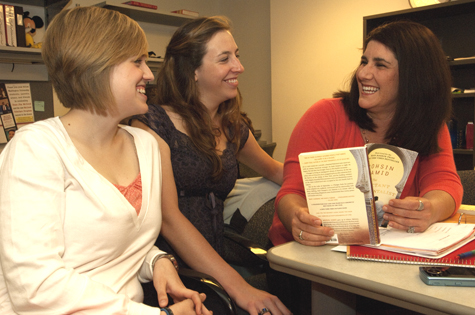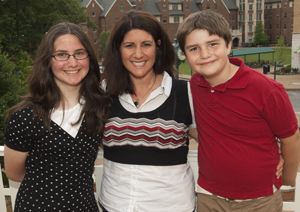
David Kilper
Danielle Bristow (right), director of Orientation and Parent & Family Weekend, meets with student orientation executive board members Ashley Brosius (left), a sophomore, and Katie Kovacs, a junior. “Danielle knows no strangers; she smiles easily, and she exudes warmth and concern for every one of our students,” says Sharon Stahl, associate vice chancellor for students and dean of the First Year Center.
As an undergraduate pre-med student, Danielle Bristow worked as a tour guide for her university, welcoming prospective students and their families to her campus.
The idea that Bristow, director of Orientation and Parent & Family Weekend at WUSTL, would one day find a career in making people feel welcome didn’t occur to her. Not at first, anyway.
“In my junior year, I applied on a whim and got accepted to do orientation,” says Bristow, 39, who attended the University of the Pacific (UOP) in Stockton, Calif., not far from where she grew up. “I just fell in love with what I was doing, and it really made me think: Do I really want to do pre-med? Do I really want this long-term life as a science person? Do I really love that enough?
“I loved my science classes, found them fascinating and excelled in them, but for some reason I got this bug for orientation. I remember when I was a junior or senior telling my director of orientation, ‘When you leave, I want your job!’”
Bristow stayed at UOP after graduation, working on a master’s degree in sports sciences and continuing to work on the orientation team. She moved to Kentucky a few years later, still not fully realizing her career trajectory had started with those campus tours. After a series of temporary jobs, she applied for an admissions position at nearby Spalding University in Louisville. They looked at her experience and hired her on the spot.
“I was an admissions counselor, a road warrior,” she says. “I did admissions presentations and coordinated tours and open houses because I had a knack for planning.”
The importance of student involvement
What she found lacking in the orientation planning at Spalding, though, was student involvement, and her commitment to that notion would become the hallmark for her career going forward.
“The orientation program was totally run by staff,” says Bristow, who had experienced a strong peer-led orientation program as an undergraduate student. “They didn’t have any peer leaders. So I said, ‘Hey, will you let me redesign the program?’”
They did, and she did. And she hasn’t left the world of orientation since. She joined Washington University in 2006 following similar stints at the University of Louisville and Saint Louis University.
Bristow now coordinates and implements more than 200 events for new student and parent and family orientation as well as planning Parent & Family Weekend events. She does all that with the help of one additional professional staff member and a group of incredibly energetic and dedicated student volunteers — the 12 members of her student executive board and 80 student associates (called WUSAs).
Bristow gives all of her volunteers a piece of common but important advice: You never get a second chance to make a great first impression. That great first impression starts during the summer pre-orientation programs and reaches its nexus on move-in day, when all hands are on deck.
“During training, we tell the WUSAs, ‘You need to go out. You can’t wait for people to come to you,’” Bristow says. “‘You need to go to their cars. You need to go ask what kinds of questions they have.’
“We give our volunteers a whole hour of training on how to mingle, how to shake someone’s hand, how to introduce yourself and make good eye contact.”
Bristow’s supervisor, Sharon Stahl, associate vice chancellor for students and dean of the First Year Center, says that Bristow provides an exceptional role model for her student volunteers as well as her colleagues.

David Kilper
Danielle Bristow (center) with her daughter, Alayna (left), 12, and her son, Andrew, 10.
“Her enthusiasm and energy appear to be boundless, and she leads by example,” Stahl says.
“Danielle knows no strangers; she smiles easily, and she exudes warmth and concern for every one of our students. She lives the training that the students receive as part of their membership in these amazing leadership programs, which makes every student joining us, from Day 1, feel not only welcome but part of this new community that is now their home.”
Bristow says that, although there are aspects of orientation that get repeated from year to year, she and the students must be vigilant to make sure they are not doing something just because it always has been done.
“We always take a critical look and ask, ‘Is it still working?’” she says.
Students who work with her say that Bristow’s strength as a leader comes from her genuine ability to seek out and really listen to this kind of feedback.
“She empowers students to take themselves from merely working an event to actually running the event,” says Pat Book, who graduated in 2009 with a business degree and served in the orientation office for three years with Bristow.
“Everyone involved feels solely responsible for one aspect or another of the overall program, and that empowerment drives them.”
The rest of the year
With a title like hers, Bristow often is asked, “What do you do the rest of the year?”
In addition to summer pre-orientation, traditional orientation programming in August, and January orientation for January Program, exchange and transfer students, she also collaborates with partners from Campus Life and Residential Life on a program called “The First 40 Days,” designed to expose and acclimate students to social and cultural aspects of the university and the St. Louis community.
Along the way, she’s constantly meeting with and developing the student leaders who plan and carry out much of the programming.
“We’re really looking at orientation as a yearlong process,” she says.
Like teachers and many others involved in student-focused professions, Bristow often does not know the impact of the work she does for many years. It sometimes isn’t until young alumni come back for a visit that she knows she has made a difference in someone’s life.
“I’m just this one little person who they may have spent some time with years ago, but it really makes a difference for me when they come back for a visit and seek me out,” says Bristow, who fills the bookshelves in her office with little mementos from students and orientations past.
“I get to meet with amazing students who do things that I’ll never do, and I sort of live my life vicariously through them.”
Seeking balance
When she’s not at work on campus, Bristow often can be found … on campus, attending student shows with her kids, she says, laughing.
“I’m a total Wash U. nerd,” she says. “It’s what I do with my free time.”
But as a single mom with two children, there are plenty of other responsibilities keeping her busy, too. Her daughter, Alayna, is 12 and her son, Andrew, is 10. Andrew plays football, basketball and baseball, and Alayna writes poetry, short stories and loves to read, Bristow says. Bristow’s mother and sister also now live in St. Louis, and that extended family is very important to her.
“I’m a single parent, so it’s about balancing,” she says. “Sometimes I just like to go home and hang out with them, and thank goodness my mom lives in town. She lives two miles from me, and so she’s very helpful in maintaining what I do.”
So what is it about the Washington University first-year experience that makes it special? Bristow believes there are two elements that set it apart.
“For new students, it is the access to upperclassmen, faculty and staff that is special,” she says. “We can present a bazillion different resources to them, but they may not remember any of it. But if they make a real connection with one person and they go to that one person and say, ‘I’m having trouble in class,’ then we’ve provided them with a resource and knowledge that’s important. That’s what I think we do really well.”
In the end, some days, she still just feels good about being a tour guide for new students.
“I like interpreting this place for new people,” she says. “I like helping students and parents navigate the campus. I want them to walk out of [orientation] feeling that they ‘get it,’ that they know there is somebody they can call, no matter what.”
Fast facts about Danielle Bristow
Education: BA, 1992, MA, 1994, sports sciences, University of the Pacific, Stockton, Calif.
Family: Lives in nearby Webster Groves, Mo., with her daughter, Alayna, 12, and son, Andrew, 10
Best advice she gives to students: “Don’t spend your time doing a major or being in a club or organization that you don’t absolutely love.”
Dream job if she didn’t work at WUSTL: “This may sound corny, but I really think I have my dream job. But if I were more talented, maybe I’d be on Broadway!”